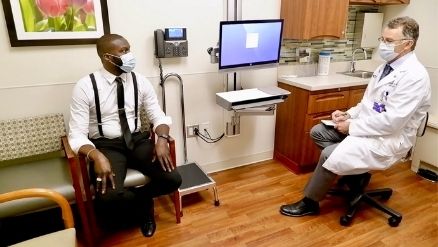-
Thyroid and Endocrine Surgery Program
The Northwestern Medicine Comprehensive Thyroid and Endocrine Surgery team is dedicated to the evaluation, diagnosis and treatment of endocrine tumors and benign endocrine disorders.

Endocrinology and Metabolism
Northwestern Medicine provides comprehensive diagnosis and treatment of cancers and diseases of the pituitary, thyroid, parathyroid and adrenal glands.
Endocrinology and Metabolism at Northwestern Medicine
Northwestern Medicine provides comprehensive diagnosis and treatment of cancers and diseases of the pituitary, thyroid, parathyroid and adrenal glands.
Specialized services are provided for diagnosis and treatment of diabetes, thyroid cancer, polycystic ovarian syndrome (PCOS) and osteoporosis.
A metabolic disorder is a medical disorder that affects the production of energy within individual cells. The main conditions associated with metabolic disorders include insulin resistance, hypertension (high blood pressure), cholesterol abnormalities and an increased risk for clotting.
Most metabolic disorders are genetic, though a few are "acquired" as a result of diet, toxins and infections. Patients are most often overweight or obese. Type 2 Diabetes, or diabetes mellitus type 2, is the most commonly known metabolic disorder.
Your endocrine system
Your endocrine system is a complex system of hormones that regulates many of your body’s functions. Your endocrine system includes:
- Pancreas
- Thyroid
- Pineal gland
- Hypothalamus
- Adrenal glands
- Pituitary gland
- Ovaries
- Testes
- Many other organs that respond to, change or metabolize hormones
Endocrinology and metabolism research
Since its establishment, basic and clinical research have been an integral part of the mission of Northwestern Medicine. Northwestern Medicine physicians are national leaders in many areas of clinical research.
We are committed to finding answers to today's most disabling and puzzling medical problems. Working collaboratively with the scientists of Northwestern University Feinberg School of Medicine, our physicians are translating exciting research advances discovered in the laboratory into more effective treatment approaches and prevention strategies for our patients.
The Division of Endocrinology/Metabolism has a training program supported by the National Institutes of Health (NIH) and participates in several NIH-sponsored research trials, including the multicenter trial on prevention of diabetes and ongoing research into management of gestational diabetes. In addition, faculty members participate in NIH-sponsored National Center for Infertility Research.
Clinical trials
Find information on National Institute of Health sponsored Clinical Trials at Northwestern University, ClinicalTrials.gov. Northwestern University offers easy access to information on clinical trials on a wide variety of diseases and conditions.
Meet the Teams

Conditions
- Adrenal Gland Cancer and Disease
- Cushing Syndrome
- Diabetes
- Diabetes Mellitus and Insipidus
- Endocrine Gland Cancers and Tumors
- Gestational Diabetes
- High Blood Pressure (Hypertension)
- Lipid Disorders
- Obesity
- Osteoporosis
- Parathyroid Cancer and Disease
- Pituitary Cancer and Disease
- Pituitary Gland Disorders
- Polycystic Ovary Syndrome (PCOS)
- Thyroid Cancer
- Thyroid Disorders
- Thyroid Nodules




